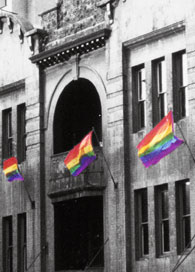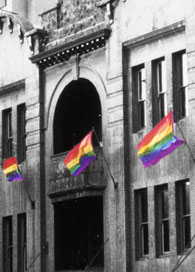In an article published on 19 September 1970, John Ware and Christabel Poll became the first individuals to publicly acknowledge their homosexuality in Australia. In his archival account of Australian gay activism, Graham Willett suggests this date as the possible "birthday" of the Australian gay and lesbian movement. But what appeared to offer people a sense of relief in discovering that they were not alone soon revealed that there was no natural unity to be found amongst the hidden homosexual community.

What emerged in the articles published during that first year was an awareness of the differences that existed amongst those who identified as non-heterosexual. Not only was this shown through attempts to recognise the ideological differences between the identities of lesbian, transvestite, transgender and the male homosexual, but also in the opinions expressed. "Cunt is a Christian Word" was the title of a poem for which the author Wendy Bacon was being prosecuted. In support of the author's position and as an example of their active stance against censorship, CAMP published the poem in full, inserting it as a lift-out section of their newsletter. The reactions to this were strong.
I consider this a gross misuse of our organization... This girl and her stand which I find degrading have nothing to do with our organization and its concerns. How can we hope to obtain law reform if we are going to link ourselves with protests of this kind[?]
A few months later, the author of an article entitled "The Commercial Boy$ of $ydney" reasserted this oppositional position when he wrote that "while it might be right for homosexuals to have some personal sympathy with other minority groups who are also classed as criminals... Our only way of changing public attitudes to homosexuality is by divorcing it from these other issues..." But the leaders of CAMP maintained their stance that support for reformative legalisation in such areas as prostitution and abortion did not imply desire to participate or approval of the activities involved. They claimed that this support merely recognised the "rights of the individuals who live in complex and pluralist societies."
As part of the campaign to encourage greater confidence and unity, the CAMP organisers asserted a need for all homosexuals to "come out" of the "closets" in which they had been forced to live by the oppression of heterosexuality. A refusal to stand up and be counted was equated with a cowardly acceptance of the heterosexual manners of public behaviour that all people were forced to abide by. The "revolution" could only be won with numbers.

This tactic failed to appeal to those who rejected the assumption of silence = death. And the level of disagreement could not be ignored. The reluctance to allow the freedom of the homosexual to be undermined by "raving queens" or by those whose deviance went beyond what a foreseeable goal of equality would allow began to influence the position many homosexuals chose to take. Poll's initial hope for a "situation where people's sexual and emotional preferences are no more relevant than the colour of eyes" rapidly turned into a fight between those who wanted to live in isolation and those who wanted a "total revolutionary movement" .
One year after the groundbreaking article had appeared in The Australian, while expressing an acceptance of the diversity that had emerged, John Ware admitted that active members of CAMP did not offer "as representative a sample of homosexuals as we would want. They come mainly from middle class backgrounds." The insistence on an open debate - the coming out of the closet prerequisite - had isolated some while naively leading others into territory they did not know how to control. "One of the beaut things about homosexuality is that it is almost the only remaining international underground movement," wrote one despondent critic. "Why spoil it?" The exposed homosexual had to learn how to cope in an environment where heterosexuality was recognised as the owner of freedom. If he was to achieve his stated dream of equality, the homosexual would have to start asserting his own normality alongside that of the very person he recognised to be the oppressor. He would have to turn his back on moral campaigns that appeared to distract from a focus on the homosexual self.
In January 1971, the leaders of the movement had warned against adopting an American approach to gay liberation in Australia.
We do not advocate that homosexuals in Australia should immediately march down the street carrying Gary (sic) Liberations placards but we do feel that it should be recognized by all homosexuals that it is a necessary step to be taken eventually - maybe not for twenty years.
In fact, the first Australian gay liberation demonstration took place in Sydney on 6 October 1971. The philosophy of unification out of the closet won control of the homosexual's fight for freedom. The differences the had emerged were to be played down as the fight for homosexuality equality headed for the corridors of political power. Here, group commonality and the oppression of normality were seen as stronger tools for reform than the revolutionary demand for an uncontrollable freedom to explore one's sexuality without identity definition.











 Printable Version
Printable Version










Reader's Comments
Be the first to leave a comment on this page!
Please log in to use this feature.